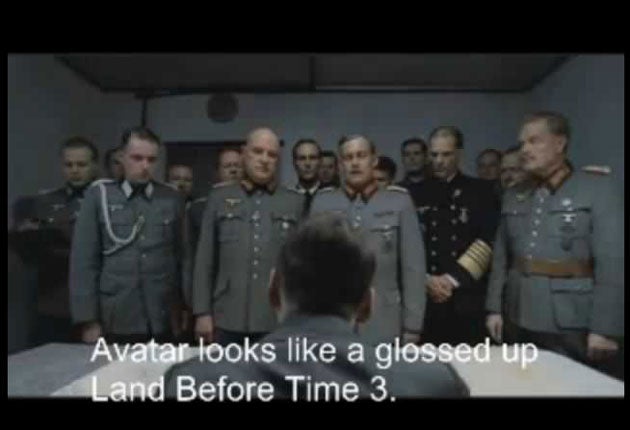Tim Walker: Facebook wants to tame the web

Your support helps us to tell the story
From reproductive rights to climate change to Big Tech, The Independent is on the ground when the story is developing. Whether it's investigating the financials of Elon Musk's pro-Trump PAC or producing our latest documentary, 'The A Word', which shines a light on the American women fighting for reproductive rights, we know how important it is to parse out the facts from the messaging.
At such a critical moment in US history, we need reporters on the ground. Your donation allows us to keep sending journalists to speak to both sides of the story.
The Independent is trusted by Americans across the entire political spectrum. And unlike many other quality news outlets, we choose not to lock Americans out of our reporting and analysis with paywalls. We believe quality journalism should be available to everyone, paid for by those who can afford it.
Your support makes all the difference.Facebook doesn't really do irony, and nor would you if you were an $11.5bn internet behemoth with upwards of 400 million users. So all those blue "Like This" buttons that you'll have noticed appearing web-wide this week, eagerly waggling their little upwards-pointed thumbs, are in complete earnest. The roll-out of "Like" widgets to sites such as IMDB, Yelp and Slate allows Facebook users to instantly recommend movies, restaurants and news articles to their friends without even logging in to their Facebook accounts, and was one of a number of new features announced at the company's f8 developer conference in California last week.
Presumably, Facebook's founders hope that if you're going to comment on today's news, or on last night's dinner-and-a-movie, you'll now do so not on the Slate/Yelp/IMDB message boards, but back on your Facebook page, where your friends can join the conversation. The fact that you can choose only to "like" something, not to "dislike" it, breeds sincere, straight-faced and polite positivity online and, says Facebook CEO Mark Zuckerberg, makes the internet "more social". This is all part of Facebook's grand plan to civilise the wild web: the site wants to catalogue your tastes, corral your online activity and map your social life more comprehensively than ever – and even more accurately than Google.
Sure, you've been able to recommend things from other sites (including The Independent's) on Twitter or Digg or Facebook before – just as you would once have forwarded a viral email. But Facebook's users are considerably more numerous and active than either tweeters or diggers; they supposedly share 25 billion links with one another every month. And the "Like" button makes that process even easier.
In a related development, the music streaming site Spotify yesterday launched a raft of new "social" features of its own, including Facebook connectivity: now all your friends will know that you've secretly been using Spotify to stream old Wet Wet Wet singles. (Because if you haven't paid for them, it doesn't really count, right?) All this might make you worry about your privacy, or the pernicious intentions of marketers trying to sell you stuff based on your Facebook profile, or your diminished capacity to be snarky about something you've read online – and those concerns would be legitimate. But there's no denying the usefulness of a single site around which to arrange all your online activity. And I don't know about you, but I'd much rather take a restaurant recommendation from a friend than from a stranger. Meanwhile, if comment boards require people to declare their identities, then we'll have less of the rampant fascism, puerility and other plain loopy commentary that characterises the less-policed parts of the web today.
The human instinct is to catalogue everything, to bring information under control. Google bent the internet to its will in the Noughties, and experts like Michael Arrington of TechCrunch suggest the next decade will belong to Facebook. All that said, organising the web does take some of the shine off the experience. There's a part of me that wants to read the rabid message board ramblings of anonymous bigots, and one of the joys of the internet is in conversing with strangers who may disagree with you about the war in Iraq, but may also invite you to swing by for a lemonade next time you happen to be in Minnesota. If we're heading back to a time when the only people you come across online are the same ones you interact with IRL (that's "In Real Life"), then what's the point?
***
Poor old Hitler. He ranted as McCain handed Obama the Presidency, raged as HD-DVD lost the format war to Blu-Ray, and railed against at Ronaldo's sale to Real Madrid. Yet after hundreds of viral videos – some more hilarious than others – he was silenced by a mere copyright claim from Constantin Films, the company originally responsible for the Downfall clip that colonised YouTube. When Downfall was first released, it was accused by some of humanising Hitler too effectively, even of turning his demise into a tragic drama. But who does Bruno Ganz's Hitler most resemble as he tremblingly removes his glasses, before snapping his pencils at the news of the Oasis split, or of his own online fame as a figure of ridicule? Not so much King Lear as Basil Fawlty, Malcolm Tucker or Victor Meldrew. If nothing else, the Hitler meme demonstrates that Downfall might, after all that, have been a comedy.
Join our commenting forum
Join thought-provoking conversations, follow other Independent readers and see their replies
Comments